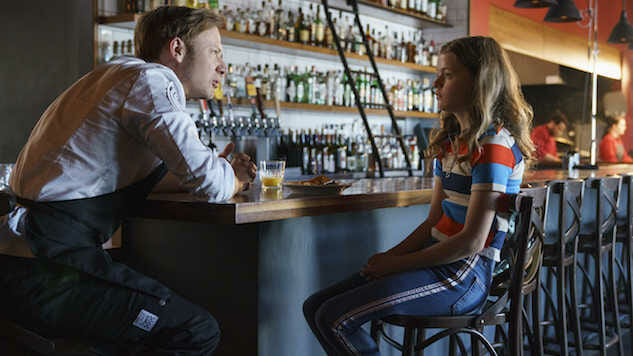Into the Dark Makes a Truly Dreadful Foray into #MeToo Territory with “Treehouse”
Photo: Aaron Epstein/Hulu
Out with the old and in with the new. We’re in the midst of spring now, and that means Hulu’s monthly horror anthology Into the Dark is moving from familiar holiday observances to more abstract ones—something that makes the grasping, icky, #MeToo-adjacent “Treehouse” even worse.
The Ides of March-themed thriller focuses on its ancient role as a date for debt-settling rather than anything too Shakespearean, and in any case “Treehouse”—directed by James Roday (Psych’s increasingly prolific multi-hyphenate), who co-wrote the script with Todd Harthan—is contemporary, or at least banks on seeming so. Its opening shots of sticky, sweaty decadence as a bruised and battered woman sips wine on a sunny desert hilltop set the misguided tone from the outset. The episode is about the trials of a sketch of a parody of a celebrity chef, Peter Rake (Jimmi Simpson), who shouts things like “It’s water, but congratulations—there’s heat involved. It’s cooking!”
Simpson is meant to play a rakish bad boy, introduced in slow motion as he pushes his hair from his eyes while terrorizing his cooks, which isn’t just out of step with Simpson’s more sensitive streak—his Westworld performance aims specifically at exploiting this—but is written so even Simpson’s talents can’t make it click. (Ryan Reynolds couldn’t make this work, and it’s basically built for him.) Zingers whip and roll and accrue references (everything from The Silence of the Lambs to The Witch) just like we’re watching Roday’s Psych character accidentally stumble through a horror film. It all but makes an acting vein strain in Simpson’s forehead while we wait for the inevitable turn.
It’s hard to take the first half-hour of the episode seriously as it attempts to force a light tone from its dickish protagonist’s perspective—he’s supposed to be quick-witted and utterly charming. Instead, the clash between this and reality is so facile it’ll bore you to tears. Roday shoots and shoots and shoots, chopping conversations up into different-angled snippets with the same impish energy as his dialogue to keep things moving. It’s all empty, charmless flash meant to replicate that of a serial killer (Ted Bundy is mentioned) or a misogynistic abuser. (Hint, hint.) But it’s so simple, without any danger of seducing or tricking us, that is feels too slight, and too irreverent for the subject matter.
-

-

-

-

-

-

-

-

-

-

-

-

-

-

-

-

-

-

-

-

-

-

-

-

-

-

-

-

-

-

-

-

-

-

-

-

-

-

-

-








































